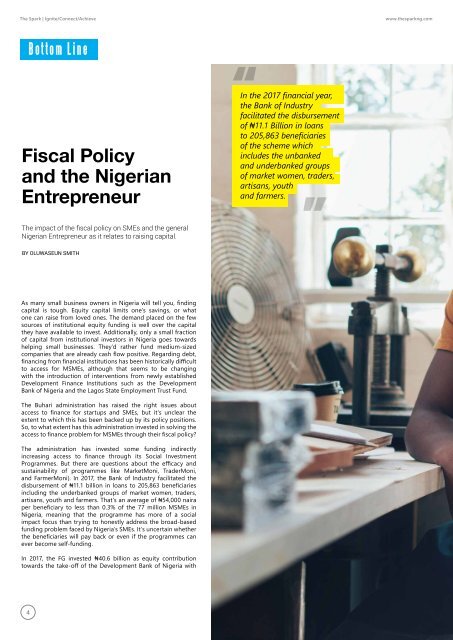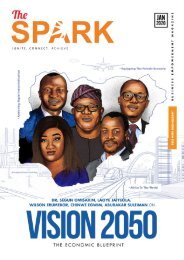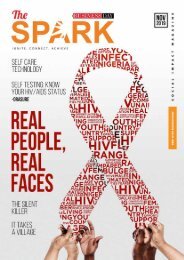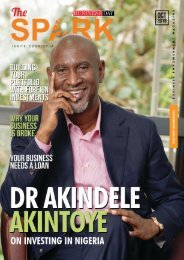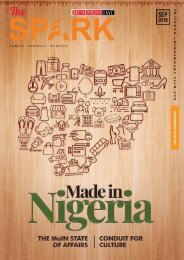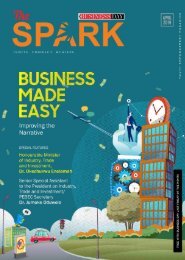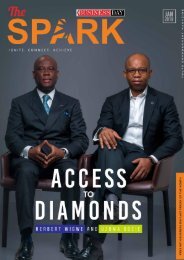Politics and Governance - More Than A Conversation
You also want an ePaper? Increase the reach of your titles
YUMPU automatically turns print PDFs into web optimized ePapers that Google loves.
The Spark | Ignite/Connect/Achieve<br />
www.thesparkng.com<br />
Bottom Line<br />
Fiscal Policy<br />
<strong>and</strong> the Nigerian<br />
Entrepreneur<br />
“<br />
In the 2017 financial year,<br />
the Bank of Industry<br />
facilitated the disbursement<br />
of ₦11.1 Billion in loans<br />
to 205,863 beneficiaries<br />
of the scheme which<br />
includes the unbanked<br />
<strong>and</strong> underbanked groups<br />
of market women, traders,<br />
artisans, youth<br />
<strong>and</strong> farmers.<br />
“<br />
The impact of the fiscal policy on SMEs <strong>and</strong> the general<br />
Nigerian Entrepreneur as it relates to raising capital.<br />
BY OLUWASEUN SMITH<br />
As many small business owners in Nigeria will tell you, finding<br />
capital is tough. Equity capital limits one’s savings, or what<br />
one can raise from loved ones. The dem<strong>and</strong> placed on the few<br />
sources of institutional equity funding is well over the capital<br />
they have available to invest. Additionally, only a small fraction<br />
of capital from institutional investors in Nigeria goes towards<br />
helping small businesses. They’d rather fund medium-sized<br />
companies that are already cash flow positive. Regarding debt,<br />
financing from financial institutions has been historically difficult<br />
to access for MSMEs, although that seems to be changing<br />
with the introduction of interventions from newly established<br />
Development Finance Institutions such as the Development<br />
Bank of Nigeria <strong>and</strong> the Lagos State Employment Trust Fund.<br />
The Buhari administration has raised the right issues about<br />
access to finance for startups <strong>and</strong> SMEs, but it’s unclear the<br />
extent to which this has been backed up by its policy positions.<br />
So, to what extent has this administration invested in solving the<br />
access to finance problem for MSMEs through their fiscal policy?<br />
The administration has invested some funding indirectly<br />
increasing access to finance through its Social Investment<br />
Programmes. But there are questions about the efficacy <strong>and</strong><br />
sustainability of programmes like MarketMoni, TraderMoni,<br />
<strong>and</strong> FarmerMoni). In 2017, the Bank of Industry facilitated the<br />
disbursement of ₦11.1 billion in loans to 205,863 beneficiaries<br />
including the underbanked groups of market women, traders,<br />
artisans, youth <strong>and</strong> farmers. That’s an average of ₦54,000 naira<br />
per beneficiary to less than 0.3% of the 77 million MSMEs in<br />
Nigeria, meaning that the programme has more of a social<br />
impact focus than trying to honestly address the broad-based<br />
funding problem faced by Nigeria’s SMEs. It’s uncertain whether<br />
the beneficiaries will pay back or even if the programmes can<br />
ever become self-funding.<br />
In 2017, the FG invested ₦40.6 billion as equity contribution<br />
towards the take-off of the Development Bank of Nigeria with<br />
4<br />
@thesparkng


